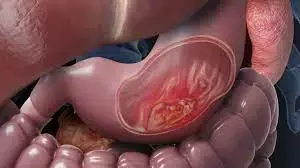- Home
- Medical news & Guidelines
- Anesthesiology
- Cardiology and CTVS
- Critical Care
- Dentistry
- Dermatology
- Diabetes and Endocrinology
- ENT
- Gastroenterology
- Medicine
- Nephrology
- Neurology
- Obstretics-Gynaecology
- Oncology
- Ophthalmology
- Orthopaedics
- Pediatrics-Neonatology
- Psychiatry
- Pulmonology
- Radiology
- Surgery
- Urology
- Laboratory Medicine
- Diet
- Nursing
- Paramedical
- Physiotherapy
- Health news
- Fact Check
- Bone Health Fact Check
- Brain Health Fact Check
- Cancer Related Fact Check
- Child Care Fact Check
- Dental and oral health fact check
- Diabetes and metabolic health fact check
- Diet and Nutrition Fact Check
- Eye and ENT Care Fact Check
- Fitness fact check
- Gut health fact check
- Heart health fact check
- Kidney health fact check
- Medical education fact check
- Men's health fact check
- Respiratory fact check
- Skin and hair care fact check
- Vaccine and Immunization fact check
- Women's health fact check
- AYUSH
- State News
- Andaman and Nicobar Islands
- Andhra Pradesh
- Arunachal Pradesh
- Assam
- Bihar
- Chandigarh
- Chattisgarh
- Dadra and Nagar Haveli
- Daman and Diu
- Delhi
- Goa
- Gujarat
- Haryana
- Himachal Pradesh
- Jammu & Kashmir
- Jharkhand
- Karnataka
- Kerala
- Ladakh
- Lakshadweep
- Madhya Pradesh
- Maharashtra
- Manipur
- Meghalaya
- Mizoram
- Nagaland
- Odisha
- Puducherry
- Punjab
- Rajasthan
- Sikkim
- Tamil Nadu
- Telangana
- Tripura
- Uttar Pradesh
- Uttrakhand
- West Bengal
- Medical Education
- Industry
Preneoplastic Lesions highly prevalent in first-degree relatives of gastric cancer patients

Worldwide, gastric cancer (GC) is the 5th cancer with the highest incidence and the 4th in mortality. To reduce it, one strategy is to diagnose preneoplastic lesions (PNL): atrophic gastritis (AG), intestinal metaplasia (IM), and dysplasia (DYS); to form risk groups on which to focus surveillance efforts as are first-degree relatives (FDR).
Preneoplastic Lesions are prevalent in first-degree relatives of patients with gastric cancer Journal of Gastrointestinal Cancer according to a recent study published in the Journal of Gastrointestinal Cancer.
Worldwide, gastric cancer (GC) is 5th cancer with the highest incidence and the 4th in mortality. To reduce it, one strategy is to diagnose preneoplastic lesions (PNL): atrophic gastritis (AG), intestinal metaplasia (IM), and dysplasia (DYS); to form risk groups on which to focus surveillance efforts as are first-degree relatives (FDR). The aim of this study was to determine the prevalence of gastric PNL in FDR of patients with GC, and to study the association with sex, age, and Helicobacter pylori (Hp) infection.
Cross-sectional study. One hundred and ten FDR, aged between 50 and 65 years, 54.5 female, obtained through convenience sampling, were studied. Biodemographic data survey and upper gastrointestinal endoscopy with the histological study were applied according to Sidney protocol, and focal lesions found. Diagnosis of these lesions and condition of mucosa was carried out by applying OLGA and OLGIM systems. Descriptive statistics, estimation of prevalence, odds ratio (OR), and 95% confidence intervals (95CI) were calculated.
Results:
- Median age of study group was 56.5 years. Prevalence of PNL, AG, IM, and DYS were 86.4%, 82.7%, 54.5%, and 12.7% respectively.
- Advanced stages of OLGA and OLGIM were verified in 18.0% and 16.3% respectively.
- No association with sex, age, and Hp infection were found respectively.
Thus, FDR of patients with GC have a high prevalence of PNL, which makes them a risk group in which endoscopic surveillance should be applied.
Reference:
Prevalence of Gastric Preneoplastic Lesions in First-Degree Relatives of Patients with Gastric Cancer: a Cross-Sectional Study by Sergio Sotelo et al. published in the Journal of Gastrointestinal Cancer
DOI: 10.1007/s12029-022-00827-x
Dr. Shravani Dali has completed her BDS from Pravara institute of medical sciences, loni. Following which she extensively worked in the healthcare sector for 2+ years. She has been actively involved in writing blogs in field of health and wellness. Currently she is pursuing her Masters of public health-health administration from Tata institute of social sciences. She can be contacted at editorial@medicaldialogues.in.
Dr Kamal Kant Kohli-MBBS, DTCD- a chest specialist with more than 30 years of practice and a flair for writing clinical articles, Dr Kamal Kant Kohli joined Medical Dialogues as a Chief Editor of Medical News. Besides writing articles, as an editor, he proofreads and verifies all the medical content published on Medical Dialogues including those coming from journals, studies,medical conferences,guidelines etc. Email: drkohli@medicaldialogues.in. Contact no. 011-43720751


